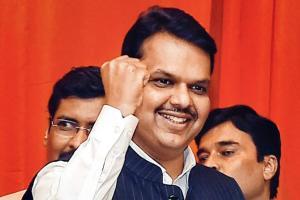Five years at the helm of affairs in the state has honed Fadnavis's political instincts and now, given a free hand, he stands poised at the cusp of yet another victory

Chief Minister Devendra Fadnavis
 In 2014, Devendra Fadnavis, then 44, was state BJP president. Buoyed by stunning returns in the Lok Sabha polls, the BJP had severed ties with the Shiv Sena for the Maharashtra Assembly elections, and promptly got into campaign mode to get a majority needed in the lower house for forming a government on its own. Despite the Modi wave, a majority mark (144) in 288-member house eluded the BJP. Fadnavis was told to lead a minority government as BJP's first CM of Maharashtra. It wasn't exactly 'a dream come true' moment for the party that was founded right here in the state.
In 2014, Devendra Fadnavis, then 44, was state BJP president. Buoyed by stunning returns in the Lok Sabha polls, the BJP had severed ties with the Shiv Sena for the Maharashtra Assembly elections, and promptly got into campaign mode to get a majority needed in the lower house for forming a government on its own. Despite the Modi wave, a majority mark (144) in 288-member house eluded the BJP. Fadnavis was told to lead a minority government as BJP's first CM of Maharashtra. It wasn't exactly 'a dream come true' moment for the party that was founded right here in the state.
ADVERTISEMENT
Five monsoons later, the BJP's boy-turned-man who has cemented his position as a politician for all seasons, has a task to accomplish – a realisation that the party can get a majority on its own even while dragging the burden of frenemy Shiv Sena along in the October 21 elections. Will Fadnavis and his support engine that works from New Delhi make it possible this time? The BJP has decided to stick to a fertile agenda of nationalism and development that won it unprecedented strength in the Lok Sabha polls.
Firm Fadnavis
Fadnavis has been given a free hand and a majority of the candidates are the CM's picks. The threats that lurked over Fadnavis from within the state unit have been sent into submission. That should make the CM safer and even stronger in his second tenure. What's more, the Sena that the CM himself desired very much in a pre-poll coalition has been reduced to a mere support cast in sharing of 288 seats. Now it remains to be seen whether the Sena, which has entered into the electoral fray for the first time through party's chief's son Aaditya, gets itself reduced to the extras in the October 24 results. The Opposition has been weakened by inducting prospective winners into the BJP fold and put in the electoral fray.
The task of achieving 144, however, does not seem as easy as anticipated by the people in BJP. If we consider the total seats that BJP and its smaller allies would be contesting, then, they shouldn't suffer more than a dozen losses to prove their collective might minus the Sena crutches. The Lok Sabha results and BJP's internal surveys say that the BJP and Sena could win 220 of the 288 seats, with the former's share of over 150 seats. Contesting separately in 2014 Assembly polls, the BJP had won 122 seats and Sena 63 in quadrangular fights. They joined hands in 2019 Lok Sabha polls to win 41 out of 48 seats.
BJP fights Sena, not Opposition
The Congress and NCP have patched up, but not really taken off as they don't have candidates, barring the established lot that did not defect to the BJP or Sena. The Congress-NCP satraps should be safeguarding their constituencies rather than campaigning for weaker candidates elsewhere. The strategy looks good because they cannot afford to give up their seats that they could still hold onto with the support of local voters who have been cultivated for years. BJP, on other hand, is so confident of winning that it has dropped 22 legislators including long-time MLAs and ministers. The Congress and NCP haven't dropped any, but had to field replacements for some sitting legislators who shifted base to the ruling combine. The Vanchit Bahujan Aghadi, Maharashtra Navnirman Sena and parties like AIMIM are poised to make some fights complicated for the ruling combine.
A relegated Opposition shouldn't be weighed so heavily this year. Like 2014, it again will be the BJP versus Sena. Then it was an open field, now it's a game of one-upmanship in the garb of unity of the two Hindutva and nationalist forces. The contests will be clear by today evening when the withdrawal of nominations happens. Both parties have pitted rebels against each other. The bargain is explicit: "We will withdraw from here if you withdraw from there". And the rebels who remain in the fight wouldn't dare to do so without approval from the leadership. They could be expelled from the parties, but welcomed back if their support is needed in bad times. The rebels who do not win but split votes to defeat the 'target' will be rewarded in some way or the other. We will not be surprised if minimising each other's strike rate remains uppermost priority for the saffron allies.
Dharmendra Jore is political editor, mid-day. He tweets @dharmendrajore Send your feedback to mailbag@mid-day.com
Catch up on all the latest Crime, National, International and Hatke news here. Also download the new mid-day Android and iOS apps to get latest updates
 Subscribe today by clicking the link and stay updated with the latest news!" Click here!
Subscribe today by clicking the link and stay updated with the latest news!" Click here!






